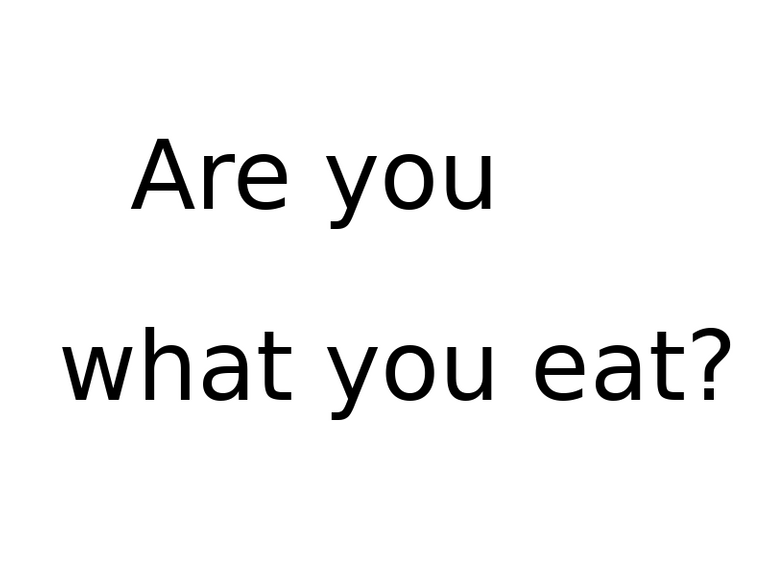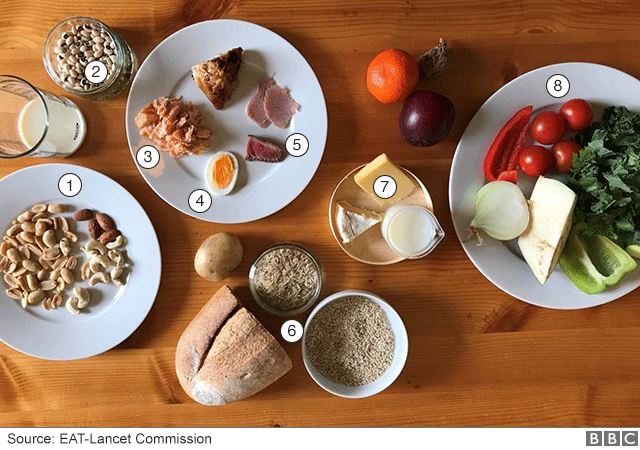
Or at least to seriously decrease human mortality.
In which case it would be fair to say that health-wise, at least, you indeed are what you eat.
The basic drive here is away from meats and sugars and towards legumes and vegetables and fruits. The diet, however, is not fully vegetarian, never mind vegan.
James Gallagher of BBC describes this diet as follows:
Reveal spoiler

Nuts - 50g a day
Beans, chickpeas, lentils and other legumes - 75g a day
Fish - 28g a day
Eggs - 13g a day (so one and a bit a week)
Meat - 14g a day of red meat and 29g a day of chicken
Carbs - whole grains like bread and rice 232g a day and 50g a day of starchy vegetables
Dairy - 250g - the equivalent of one glass of milk
Vegetables -(300g) and fruit (200g)
The diet has room for 31g of sugar and about 50g worth of oils like olive oil.
This is clearly a diet much lower in some items, such as meat and eggs and sugar, for instance, than what many in the Western normally get these days. It is also surprisingly "Mediterranean-like". And Mediterranean has long been lauded for its positive effects on one's health including lower chances of diabetes, lower incidence of inflammatory and autoimmune disease as well as of cardio and pulmonological issues.
As someone who spent some time as a vegetarian - and quite, basically due to having low energy without meat in my diet - I must say that this diet has some appeal to me. I have also noticed that when I eat too much meat it either gives me a massive energy boost, or just makes me outright sleepy. I suspect that "Planetary Health" may be exactly the right balance for someone like myself.
But personal observations aside, here are a few points I would like to make about this diet.
Modern technologies allow to grow plants extremely efficiently and with advances in autmotion, LED lighting and other relevant technologies that efficiency is only likely to increase. As for meat - while we are able to grow it in the lab, it is still predicted that at least for a few more years the price of lab-grown meat is going to be prohibitively expensive. Thus we would be stuck with the current model. And that model basically involves passing massive amounts of food and feed through a farm animal which is then slaughtered for food. I deliberately exclude the discussion of the cruelty of industrial farms from this discussion - all I would like to state here is that meat farming is definitely a rather inefficient process in terms of resource consumption.
By lowering - and massively so - resource consumption requirements for animal husbandry the Planetary Health diet promises to improve overall human health. And healthier people tend to experience less stress and thus be more open to deliberation, peaceful resolution of conflicts and overall societal cohesion.
And indeed this may be the diet for 10 billion people - a diet that could feed a much larger population using a lot less resources than we use currently. So perhaps we are what we eat - not only individually, but also globally.
Sources
Scientists Have Identified a Specific Diet That Could Save 11.6 Million Lives a Year
Lindsay Dogson, Business Insider, 19 January 2019
A bit of meat, a lot of veg - the flexitarian diet to feed 10bn
James Gallagher, BBC, 17 January 2019
$5 lab-grown burger could be ready by 2021
Daniel Nelson, Science Trends, 28 September 2018
Oh yes @borepstein, I never thought about dieting for the entire planet, but it sounds interesting!
Not saying an imposed diet - in fact, I would be vigorously against anything of the sort being imposed upon the population - but the combination of informing people and presenting them with pricing incentives may convince people to alter their habits. Which may be a great idea - especially if, objectively, this diet does offer this sort of health benefit.
We all have to be careful with our diet but instead of striving towards more lab grown meat and a population of ten billion maybe we should strive towards a more sustainable population. The amount of oil used in our fertilizers, pesticides and transportation of food, let alone gas for farming equipment is unsustainable. Soils are becoming polluted and lose nutrients each year, water tables are falling, we may also hit peak phosphorus in a couple decades.
More and more alternatives to oil emerge every day.
And yes, decreasing the population would be nice - but that is only possible through improvement in the economic situation.
Excellent review, the very idea of creating a planetary diet looks very relevant and it has its own requests for the future! Thank you Boris
Thanks.
This may indeed be a very desirable change in mass diet choices.
Great diet. It is useful for everyone and for the health of people and for the salvation of animals.
If people can not find the strength to give up meat, let them at least give up the natural fur and leather. All this has long been learned to do artificially, although not pursuing the goal of saving someone. Let progress in some way contribute to a really good cause!
Giving up meat completely may not be such a great idea.
I like this approach, and in fact it matches how I eat in general. I’m not a vegetarian, and I don’t mind small portions of meat at some meals, but I believe vegetables, legumes and grains provide the body with best fuel overall, and it is definitely better for the planet!
It doesn't look too bad. What an interesting idea and sensible since we are omnivores.
Hi. I liked your post, keep it up. I wish you good luck and have a good day, and of course you can also get a big jackpot :)
Defended (10.00%)
Summoned by @borepstein
Sneaky Ninja supports @youarehope and @tarc with a percentage of all bids.
Everything You Need To Know About Sneaky Ninja
woosh